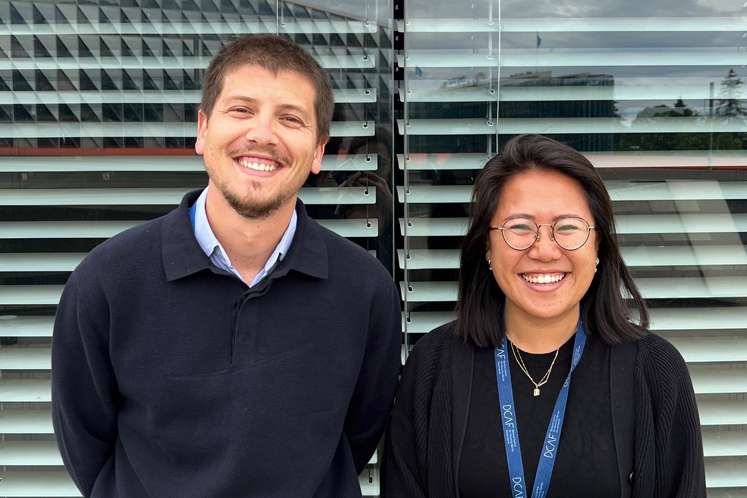5 keys to successful mentorship
One of DCAF’s sister centres, the Geneva Centre for Security Policy (GCSP), invited us to join them in fostering a first-ever collaboration in learning and development at the Maison de la Paix. Last November, we launched a six-month mentorship initiative, creating a space for staff from both centres to exchange knowledge and enhance their professional development. The programme facilitated one-on-one mentorship pairings and hosted group events for participants to enrich their experience.
As both Swiss institutions working in peace and security and neighbors in the Maison de la Paix in Geneva, this mentorship programme fostered a shared sense of purpose and collaboration between our two organizations, and within DCAF. In addition to more specific one-off training for our teams, DCAF values continuous on-the-job learning and exchange. We cultivate an inclusive work environment and encourage our own teams to continue developing new skills, expanding their networks, and creating innovative solutions to support our work worldwide.

Photo: Dawn (right), a Project Officer in DCAF’s Policy and Research Division, mentored
Federico, a Research and Project Officer at the GCSP. Photo: DCAF.
We sat down with Dawn, a Project Officer working in the Policy and Research Division at DCAF, who mentored Federico, a Research and Project Officer at the GCSP, to discuss their experience and takeaways from the initiative. They shared five keys to creating a successful mentorship relationship:
1. Choose wisely, but be open-minded
Don’t settle for a random pairing. Choose someone whose interests and plans align with yours, whether they are decades ahead of you or have just a few years more experience. Contrary to his idea of a “typical” mentorship, Federico said he, “got a lot of value from being mentored by someone that is closer in both age and in career progression, you know, three or four years ahead.” Other partnerships involved reverse mentoring, wherein a less experienced colleague mentors someone more senior. These diverse partnerships exemplify that anyone can bring a fresh perspective to your situation.
2. Show up and be present
Mentorship requires both parties to be invested. Mentees, come prepared with questions and discussion topics, and be open to implementing the suggestions you receive. Mentors, follow up on past conversations and be flexible to address what your mentee brings to you. Make time in busy calendars and treat these meetings like an opportunity to connect—think monthly check-ins to keep your momentum going.
3. It is a dialogue, not a monologue
Mentorship is a two-way street. If you are a mentor, instead of just dispensing wisdom, be open to what you can learn from your mentees. Mentees, don’t be afraid to voice your thoughts! You can both use this as an opportunity to learn from other approaches and understand different teams’ dynamics.
4. Think outside the (office) box
Consider meeting outside your workplace; grabbing a coffee or going for a walk helps build a more personal connection. Dawn highlighted that check-ins outside the office can give you the physical distance you need to get a new perspective on challenges in your professional life.
5. Give it a go
Mentorship is not just about advancing your career. It can help you clarify where you’re headed in your current role, navigate challenges within your team, or find new connections and opportunities. Thinking you might want to try being a mentor? You might be surprised at what you can offer, even relatively early in your career. Wherever you find yourself, Dawn and Federico agree on the importance of taking advantage of mentorship opportunities, and recommend their colleagues at the Maison de la Paix, to “definitely sign up next year.”
Mentorship is not a one-off thing. It's something you keep doing throughout your career to get the most value out of it.
- Federico, Research and Project Officer at the GCSP
To find out more about how the programme works, don't miss the GCSP article, which provides figures and statistics.
Mentorship is a valuable way to build new connections, exchange ideas, and foster lifelong learning. At DCAF, we support many kinds of mentorships, both for our staff and in our security sector reform work. Check out some examples of mentorship in our programming for partners around the world:
- We connected female police and immigration officers in The Gambia with experienced counterparts from the Thames Valley Police in the UK to discuss career progression, conflict management, and gender-specific challenges.
- With UN Women in Georgia we brought together women from across the ranks of the Georgian Ministry of Defence and Defence Forces. Through workshops, seminars, peer exchanges, and training, these programmes are promoting an institution-level culture shift.
- We supported the Academy for Judges and Public Prosecutors in North Macedonia to improve training and align local judicial practices with European Union standards. Bringing judges and prosecutors from the Academy to meet their counterparts in Spain, DCAF facilitated an exchange on designing and delivering judicial training programmes.
 Share on Facebook
Share on Facebook Share on Linkedin
Share on Linkedin Share on Twitter
Share on Twitter